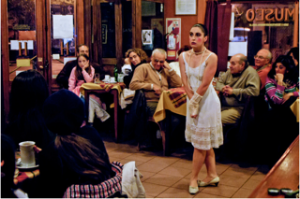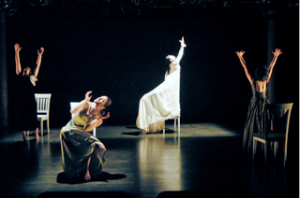Unveiling Motion and Emotion
Anabella Lenzu
Photographs by Todd Carroll

A student from age five, choreographer from age 11, and teacher from age 15, Anabella Lenzu has a lifetime of experience, exploration, and contemplation to inform her first book, Unveiling Motion and Emotion. In fifteen essays on dance pedagogy, the role of artists in society, the dancemaking process, and her personal artistic development, Lenzu reveals an immense capacity for both action and feeling.
“Never in my life have I been able to imagine doing anything but sharing dance, teaching dance, and choreographing dance.”
“We cannot control the weather, the economy, politics, what people think, or how our partner feels! The only thing we can control is our body, our own microcosm, and our attitude toward life.”
Lenzu’s attitude ranges from humor to joy to nostalgia to frustration to gratitude, according to the subject matter of each piece of writing. She aggressively calls on teachers and dancers to fully investigate every aspect of our art form: its history, cultural influences and affects, and personal intricacies. Ignorance, lack of curiosity, and inaction seem to be the Holy Trinity of thorns in Lenzu’s side:
“…Good teachers are good teachers or they are s**t. There is no middle ground.”
“My goal is to try to decode and understand why people express themselves with this body language that is emotional, intellectual, and spiritual.”
Lenzu has taught ballet, Argentine tango, modern dance, barre a terre, and dance history and criticism at universities, dance studios, companies, and cultural centers in Argentina, Chile, Italy, and the US. In a strikingly candid reflective essay, “The Teacher Learns,” Lenzu names some of the fruits of her educational labors: how to tell the truth with tact, level egos, appease anger, calm panic, receive affection and criticism, give without expectation, build dreams, inspire, celebrate life. The list takes a full page and is by turns pragmatic and idealistic.

Lenzu currently directs her own company, Anabella Lenzu/DanceDrama. Of that role, she writes:
“Being a choreographer is a way of seeing life, an attitude, a way to both absorb and react to life. It’s a way to express our thoughts and inner world.”
“Nothing makes me feel more accepted and respected than sharing my work with others.”
She also founded, directed, and edited the cultural magazine Nexos, whose publication lasted from 1998-2001. In the essay “Words Impressed on Paper,” Lenzu states:
“For me, writing is not so much a pleasure as it is a civic responsibility, and as an educator, my perennial goal is to generate appreciation for and understanding of the arts and of artists.”
That sense of responsibility is at the center of this collection of essays. Where Lenzu’s tone is steely, she never rants. That would merely be unchecked emotion without subsequent action. Nor does she ever simply describe or prescribe methods of working; her writing is filled with questions and challenges to herself, to the dance world at large, and to audiences.
“To criticize isn’t simply to make negative remarks, it means questioning the system. …Without questioning, there is conformity, which brings mediocrity.”
“Dance is at a disadvantage to other art forms with respect to its methodological development…dance is like a folk tradition; it is transmitted orally. This is the reality, but we don’t have to accept it. …We as teachers must take responsibility for our actions; students cannot be blamed for our ignorance. Worse yet, if we do not take care, our ignorance will be passed on to younger generations. This is my call for an educational conscience.”

Action, investigation, contemplation, and further action: these are the responsibilities of all artists. Lenzu has chosen—or been chosen by—dance as her investigative framework because, as her opening essay is titled, “dance underlies all that I am.”
This boldly provocative collection of writing should be in every dancer’s personal library.
For more information about Anabella Lenzu/DanceDrama and Unveiling Motion and Emotion, visit http://www.anabellalenzu.com/book/.




